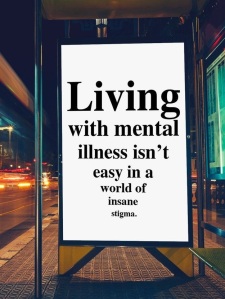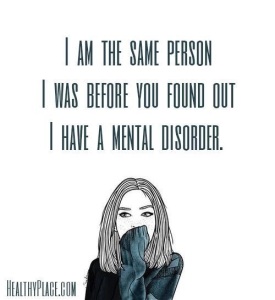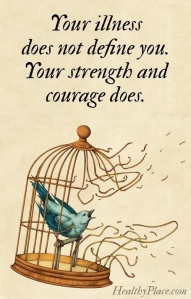The Diagnostic and Statistical Manual of Mental Disorders (DSM) origins date right back to 1840 but it was really born in 1952 when it was first published as the DSM-l and featured descriptions of 106 disorders. The DSM has evolved and expanded over the years and now is the DSM 5 which was last updated in 2013. It currently holds over 250 mental disorders over 947 pages which is a long way from the 130 pages back in 1952. Even before the DSM though there have been many books, manuals, texts, guides and much speculation regarding mental illness.
The term ‘mental health’ was popularised in early 1900’s by physicians, social reformers and asylum patients but mental illness dates back hundreds of years.
Over the years it seems many people from various walks of life have had an opinion, judgement, idea or theory about mental illness and a box to put you in if you or your behaviours were deemed “abnormal” or rather socially unacceptable.
From physicians, consultants, psychiatrist, psychologists to nurses, patients and basically anyone who’s anyone they’re all quick to speculate, scrutinise and label.
Our knowledge and understanding of mental illness has come a long way over the years. What’s come with this greater understanding though is a world that wants to label anything and everything. To pigeon-hole, categorise , summarise, assess and slap a name on it whether it be right or wrong, accurate or not and then sadly the name/diagnoses often sticks, wanted or not.
 In the UK alone 1 in 4 people are diagnosed every year with a mental illness and over 459 million people worldwide are diagnosed with a mental illness. Unfortunately no matter how great our understanding and knowledge has become within the mental health sector as a society there is still an overwhelming amount of stigma, discrimination and misconceptions towards those who suffer.
In the UK alone 1 in 4 people are diagnosed every year with a mental illness and over 459 million people worldwide are diagnosed with a mental illness. Unfortunately no matter how great our understanding and knowledge has become within the mental health sector as a society there is still an overwhelming amount of stigma, discrimination and misconceptions towards those who suffer.
Diagnosing someone with a mental illness in its self can be quite damaging and often comes with a backlash of problems. Being given a diagnoses/label can cause people to see you as this (the label) rather than you the person. Thanks to the media, which isn’t always so accurate in reflecting what having a mental illness is truly like and frequently misrepresenting mental health issues, we have a society that sees mental illness the way the media does.
It’s alarming to me how badly the media portrays mental illness. Across countless tv shows I watch horrified as characters play out in such a negative way someone suffering from some form of mental illness. More often than not these characters are aggressive, explosive, dangerous people, who have wild reckless, uncontrollable behaviours. I’ve watched widely popular shows that describe certain diagnoses in the absolute extreme cases and will over emphasise given behaviours/characteristics. Society then worryingly absorbs this information as in many cases it’s the only experience of mental illness they have to recall upon then they tar everyone suffering with the same discriminating brush.
This and other influences have caused me to question: is having a diagnosis helpful?
As a teenager I would scroll through countless psychology/self help books on the floor of Borders, desperately searching for the answer. I would sit there for hours taking notes, frantically jotting down anything that remotely described how I was feeling or matched any of my disturbing thoughts. I needed to know I wasn’t alone, that I wasn’t a freak, that someone understood and more than anything what the hell was wrong with me and how I fixed it!
I knew for a long time I was different I just didn’t quite know why or how. I wanted an answer something in black and white that I could understand. I guess I hoped for a diagnosis. Much like when you don’t feel well with let’s say a tummy pain, it’s strange, unfamiliar and terribly painful. You want to know what it is. The longer it persists the more you long for an answer. You try figuring it out yourself and maybe try different remedies to ease the pain but nothing helps so you go to your doctor in hope they’ll have a diagnosis and treatment plan to follow.
Now imagine the doctor has no idea they can’t diagnose you, you are left struggling without hope of getting better because without knowing the cause you don’t know best how to treat it and make it better.
So I longed, prayed and begged that there would be answer, a label I could stack all my crazy behind and fix it.
My relief came at 19 when on a psychiatric ward and after being assessed more times than I care to remember I was finally given my answer. The nurse from behind the reception desk announced I was ‘border line personality’, not I have it but I AM IT!! (Something I look back on with great sadness)
I had hope, a glint, that now I knew what I was/had I could begin making me feel better, be better.
Over the weeks, months that followed I read every book that explained on any level anything about this diagnosis, my diagnosis. Soon it became apparent to me it was hopeless, I was plagued. I was described over and over again as manipulative, attention seeking, aggressive, chaotic, difficult to be around and impossible to like and that services had pretty much given up on treating me or helping me feel better. So I challenged it, fought it and rejected it as much as I could. I was unwilling and unable to see that the more I fought it, the more difficult it all became. I had to accept it, understand it so I could begin to work with it or rather try live with it.
 Now thankfully over the years I’ve realised I am not BPD but rather I battle with BPD! My illness doesn’t define me, it’s not who and what I am but rather something I struggle with every minute of everyday. I am now in a place where I know and understand what the diagnosis means to me, how it effects me and most of the time how I can live with it as painful and difficult as it maybe.
Now thankfully over the years I’ve realised I am not BPD but rather I battle with BPD! My illness doesn’t define me, it’s not who and what I am but rather something I struggle with every minute of everyday. I am now in a place where I know and understand what the diagnosis means to me, how it effects me and most of the time how I can live with it as painful and difficult as it maybe.
I have been able to take a step back and see these books don’t talk about me and my struggles but are an assumption of what someone maybe like who has the same diagnosis.
I have learnt in part how my illness can work for me ie. as a parent and become more self aware so I don’t rely upon others interpretation of what they think I should be.
All this said though I find having a diagnosis a huge detriment to me, even up to the present day.
I may have accepted my diagnosis but others certainly haven’t and as its misconstrued within society more than ever I often find myself frustrated, angered and resentful I have such a label slapped on my head.
From the beginning its caused me more pain and suffering. I have been rejected from certain services upon disclosing my diagnoses, been discriminated against and completely shunned by people in and out of services and the medical field. I have not been seen as an equal the minute I have shared my diagnosis and been refused help on many occasions.. Even recently I was rejected from a mother and baby unit on the basis of my diagnosis even though at that time I was depressed and needed support. I am not seen as me, at face value. I am not seen as how I represent but rather as my diagnosis says I could be.
 I am not offered the treatment I require in that given moment for the difficulties I am facing at that time or the issues I’m currently working through. I am seen as a diagnosis, I am lost to it, how I’m feeling at that time is irrelevant because my diagnosis or a diagnosis needs putting on me on how I’m feeling so then people can feel better about how best to treat me when in reality they just need to see me and not spend their time trying to fit me into a box so they can feel more comfortable (my current care team are certainly not included in this thankfully).
I am not offered the treatment I require in that given moment for the difficulties I am facing at that time or the issues I’m currently working through. I am seen as a diagnosis, I am lost to it, how I’m feeling at that time is irrelevant because my diagnosis or a diagnosis needs putting on me on how I’m feeling so then people can feel better about how best to treat me when in reality they just need to see me and not spend their time trying to fit me into a box so they can feel more comfortable (my current care team are certainly not included in this thankfully).
Why can we not just treat people how they are in any given moment? Fill their current needs and help them with what they need now rather than summarising, categorising, assessing , ticking boxes and labelling them often with something that’s going to be much more damaging in the long run?
I believe in part diagnosing illness is beneficial especially with some treatments plans but I also believe people shouldn’t be seen as their diagnoses and that people should be seen at face value.
Does having a diagnoses help you? Do you feel better having one or has it brought with it more pain?
Comments on: "Is having a diagnosis helpful?" (2)
Reblogged this on LYPFT Planning Care Network.
LikeLike
Reblogged this on The Care Coordination Association.
LikeLike